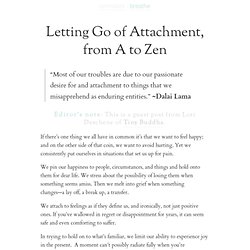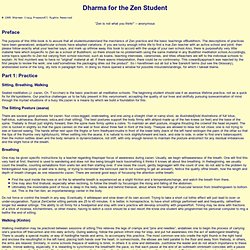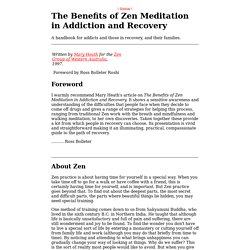

Calm.com. Rainy Mood. 101 Zen Stories. Zen Poems and Koans. Zen. Zen is a school of Mahayana Buddhism[note 1] that developed in China during the Tang dynasty as Chán.

From China, Zen spread south to Vietnam, northeast to Korea and east to Japan. Zen emphasizes rigorous meditation-practice, insight into Buddha-nature, and the personal expression of this insight in daily life, especially for the benefit of others. As such, it deemphasizes mere knowledge of sutras and doctrine and favors direct understanding through zazen and interaction with an accomplished teacher.
The teachings of Zen include various sources of Mahāyāna thought, especially Yogācāra, the Tathāgatagarbha Sutras and Huayan, with their emphasis on Buddha-nature, totality, and the Bodhisattva-ideal. The Prajñāpāramitā literature and, to a lesser extent, Madhyamaka have also been influential in the shaping of the "paradoxical language" of the Zen-tradition. Etymology[edit] Zen practice[edit] Dhyana - Zen meditation[edit] Central to Zen is the practice of dhyana or meditation.
Lay services[edit] ZEN. Zen: The Best of Alan Watts. A person who thinks all the time has nothing to think about except faults, so he loses touch with reality and lives in a world of illusions. By thought I mean the chattering inside the skull; perpetual and compulsive repetition of words, of calculations, and symbols going on inside the head. » Start Here.
By Leo Babauta I know a lot of people who fall into a slump, losing the habit of exercise, procrastinating with work, slipping into a bad diet, and generally not feeling motivated.

It’s hard to get out of a slump like that. It’s hard to get going again, to get started when all the forces of inertia are against you. Here’s how to get started, in just a few easy steps. Pick one thing. With every single step, you’ll feel better. Just announced: Dealing with Your Struggles video course. » Letting Go of Attachment, from A to Zen. “Most of our troubles are due to our passionate desire for and attachment to things that we misapprehend as enduring entities.”

~Dalai Lama Editor’s note: This is a guest post from Lori Deschene of Tiny Buddha. If there’s one thing we all have in common it’s that we want to feel happy; and on the other side of that coin, we want to avoid hurting. BEGINNER'S GUIDE ... © 1995 Dharman Craig PressonAll Rights Reserved “Zen is not what you think!”

-- anonymous Preface The purpose of this little book is to assure that all studentsunderstand the mechanics of Zen practice and the basic teachings ofBuddhism. The descriptions of practices have been generalized, andparticular schools have adopted variations. Part 1: Practice Sitting, Breathing, Walking Seated meditation (J. zazen, Ch. The Sitting Posture (asana) There are several good postures for zazen: four cross-legged, onekneeling, and one using a straight chair or camp stool, as illustrated[Add illustrations of full lotus, half-lotus, sukhasana, Burmese, seiza,and chair sitting]. Breathing One may be given specific instructions by a teacher regarding theproper focus of awareness during zazen. Do not force or control the breath in any way. Walking (Kinhin) Part 2: Theory The Buddha The Dharma The Four Noble Truths 1.
How to do Zazen - Seated Meditation Video. Hi, I am Patrick and today we are talking about Zazen and how to do it.

Meditation isn't just for buddhas or monks; it's for everybody that can be done at almost any time. So let's get started. When you sit, you are going to want to elevate your pelvis. The most useful thing for this is something like a Zafu, it's a round Japanese shape. But honestly anything will work, a pillow folded in half, a rolled up blanket is just as good. As you sit, you want to have a stable base as possible. Addiction and Zen. A handbook for addicts and those in recovery, and their families.

Foreword I warmly recommend Mary Heath's article on The Benefits of Zen Meditation in Addiction and Recovery. It shows a sensitive awareness and understanding of the difficulties that people face when they decide to come off drugs and gives a range of strategies for helping this process, ranging from traditional Zen work with the breath and mindfulness and walking meditation, to her own discoveries.
Taken together these provide a kit from which people in recovery can choose. Its presentation is vivid and straightforward making it an illuminating, practical, compassionate guide to the path of recovery. ..........